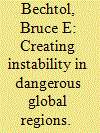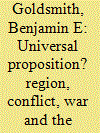| Srl | Item |
| 1 |
ID:
087986


|
|
|
|
|
| Publication |
2009.
|
| Summary/Abstract |
North Korea contributes to instability in the Middle East and South Asia through its proliferation of missiles and other weapons systems used as delivery platforms for chemical (and the production of chemical munitions) or biological weapons, including long-range artillery. Evidence also shows that North Korea has collaborated in the nuclear programs of Syria, Iran, Libya, and Pakistan and has provided weapons and training to terrorist groups in both the Middle East and South Asia (Hezbollah and the Tamil Tigers). Given the recent decision by Washington to take Pyongyang off of the list of State Sponsors of Terrorism, the recent and ongoing activity by North Korea directly related to proliferation of WMD and the support of terrorist groups could lead to severe foreign policy challenges for the United States and its allies in the future.
|
|
|
|
|
|
|
|
|
|
|
|
|
|
|
|
| 2 |
ID:
075743


|
|
|
|
|
| Publication |
2006.
|
| Summary/Abstract |
This article assesses the robustness of the liberal or 'Kantian' peace propositions by challenging two common practices: pooling data for different geographic regions, and using conflict at any level as a proxy for interstate war. The findings indicate that there are substantial differences between regions in the effects of democracy, economic interdependence, and international organizations. Conflict (all MIDs) and war have considerably different relationships to these key variables, and to each other, across regions. While I do not argue that these results undermine the general Kantian peace propositions, they do represent powerful qualifications that provide insight into theoretical foundations and raise related questions of specification error. They also point to the continuing importance of concepts such as security communities and norms as liberal factors distinct from the Kantian variables.
|
|
|
|
|
|
|
|
|
|
|
|
|
|
|
|